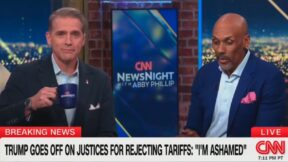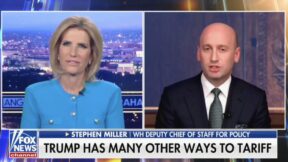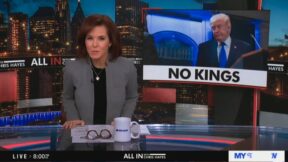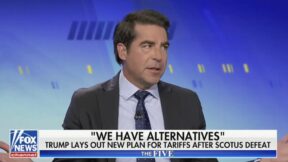‘We Don’t Got the Time Today for This!’ Abby Phillip Table Erupts Over Whether Obama is Actually ‘Black’
CNN’s Abby Phillip tried pivoting a debate at her table on Saturday in which one panelist asked whether former President Barack Obama is “Black.”
On CNN’s Table for Five, The Fifth Column podcast co-host Kmele Foster surprised everyone when he asked, “Is he Black?” as Obama was being discussed.
Foster earlier had argued Obama made the country much more divisive, an argument Phillip said she’d heard from conservative podcaster Ben Shapiro as well.
Foster said:
I too miss that particular era of our politics. Things were a little bit less acrimonious. That said, I do think that the election of Barack Obama in some circles is perhaps a little more generous than mine. That much vaunted speech on race, where he refers to his grandmother as kind of a typical white person. I don’t think there is such a thing as a typical white person. I think there’s a sense in which Obama was expected to usher us into this new era of much healthier conversations, more nuanced conversations about race. But on his watch, we actually got the Trayvon Martin situation… we remember the beergate summit where initially there was this I think the police officer acted stupidly. No, it turns out that things were a lot more complicated. The Trayvon Martin situation. He also says if I had a son, he would have looked like trayvon. I’m not certain or not that’s relevant.
CNN political commentator Ashley Allison and Foster later erupted into a debate on race in America.
“We’re missing one important key of this fact pattern is that Barack Obama is black,” Allison said.
“Is he black? What does that mean exactly? His mom is? His father is? Are we still operate under the one-drop rule and the brown paper bag test?” Foster asked.
“Whatever your definition might want to be if he’s Black, when most people look at him, no, no no no, you’re black, I’m black, and Abby’s Black, Barack Obama’s Black,” Allison shot back.
“We don’t got the time today for this one!” Phillip said as the two argued back and forth.
Check out the entire exchange below:
ASHLEY ALLISON: We’re missing, like, one important key of this fact pattern is that Barack Obama is Black. And that actually is a bit, no, it is —
KMELE FOSTER: Is he Black? What does that mean exactly? His mom is? His father is? Are we still operate under the one-drop rule and the brown paper bag test?
ALLISON: Whatever your definition might want to be if he’s Black, when most people look at him, no, no no no, you’re black, I’m black, and Abby’s Black, Barack Obama’s Black.
ABBY PHILLIP: We don’t got the time for this one today! Let me just say, I just think that this is interesting because, Ashley, I’m hearing you say that part of the problem was that Barack Obama constantly reminded white America that he considered himself to be Black. And that that was part of what they found offensive.
ALLISON: He reminded them every time — wait, guys, we are, the majority, my father was blind, but the majority of Americans are not blind. He didn’t have to open his mouth for people to be reminded that he was the first one that was different than any other president that has ever been in this country.
FOSTER: Every every president has been different because they’re all individuals.
ALLISON: Bruh, no.
FOSTER: There was a moment on a campaign trail where someone stood up and talked to then-candidate Obama and said, “hey, look, all my friends keep telling me you’re Black. I tell them, no, you’re biracial.” And he lurched at the opportunity to say, “hey, I’m perceived as black. I’m so glad I have an opportunity to talk about this. That’s how I self-identify.”
ALLISON: So you didn’t think he was Black?
FOSTER: I am an individual. I am not a Black man. I don’t even know what that means. I am individual. Race is a preposterous social construct.
ALLISON: Do you feel like that when you get pulled over by the police?
FOSTER: I do feel like when I get pulled over by the cops.
ALLISON: Must be nice.
FOSTER: You know why? Because when they talk to me, they’re engaging with this vernacular. They’re engaging me in this particular way. And it’s impossible to misconstrue what’s going on here.
ALLISON: What is going on there? What is going on there? A different type of Blackness than when somebody that actually might not have that vernacular?
FOSTER: I’m an individual.
ALLISON: Wait. Hold on. You just said a lot there.
FOSTER: So apparently we do have time.
ALLISON: Okay, so you said when you were pulled over by a police, as an individual who happens to have skin that is Black, let’s say that, or brown, whatever, darker than white, okay? That when they hear your vernacular, they realize what they’re engaging with, and what is that?
FOSTER: A sophisticated individual.
ALLISON: And so when a Black person who is pulled over that you might not deem as a sophisticated individual, how will they get engaged with?
FOSTER: The issue would not be their race, it would be the degree of sophistication they have or don’t have to navigate the situation.
ALLISON: And when a white person is pulled over —
FOSTER: Again, sophistication is still the key issue.
ALLISON: The statistics don’t support that.
Watch above via CNN.
New: The Mediaite One-Sheet "Newsletter of Newsletters"
Your daily summary and analysis of what the many, many media newsletters are saying and reporting. Subscribe now!






Comments
↓ Scroll down for comments ↓